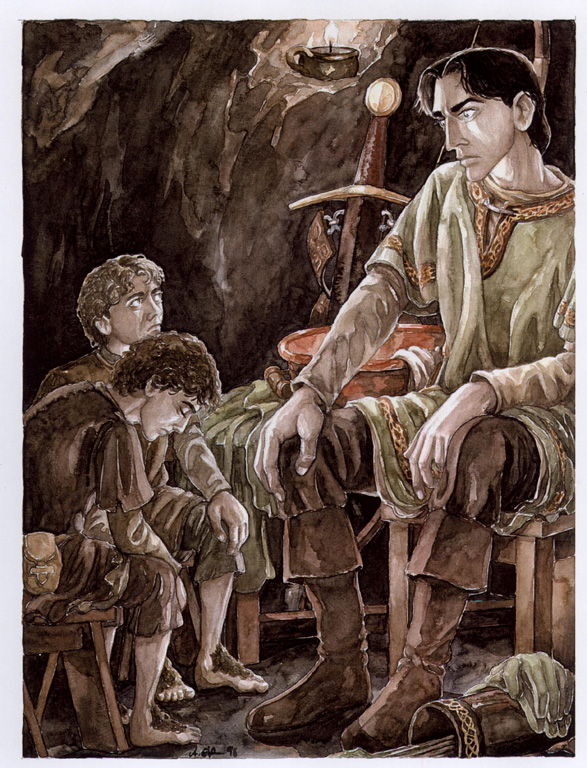The Two Towers by J.R.R Tolkien (Harper Collins 1991, 2007) pp.888-890
Faramir’s reflections upon the decline of the West bring him to a melancholy mood. Frodo has fallen silent and so Sam enters the conversation asking Faramir why he has not spoken more about Sam’s great love, Elves.

Anke Eissmann depicts the quiet conversation between Faramir and the hobbits.
“No, indeed, Master Samwise,” said Faramir, “for I am not learned in Elven-lore. But there you touch upon another point in which we have changed, declining from Númenor to Middle-earth.”
And so Faramir speaks of the ancient alliance between Elves and Men, the Edain of Beleriand, of whom Beren was one of the great heroes and about whom Tolkien’s early readers were largely ignorant before the publication of The Silmarillion that took place after Tolkien’s death. And he speaks of the gradual sundering of Elves and Men in Middle-earth during the Third Age.
“In Middle-earth Men and Elves became estranged in the days of darkness, by the arts of the Enemy, and by the slow changes of time in which each kind walked down their sundered roads.”
And so through the mouth of Faramir Tolkien draws out his belief that a key feature in the decline of which he speaks is melancholy, not as an occasional mood such as the one into which Faramir has fallen in the quiet of the cave behind Henneth Annûn as night falls about him, but as a settled state of mind. He speaks of a growing fascination with death among the great of his land so that tombs become more splendid than palaces. Later Legolas and Gimli will note the silence of the streets of Minas Tirith and an absence of children as further signs of this state of mind,
Faramir speaks of this and adds that his people have drawn into themselves, into a self-obsessed introspection and have forgotten their roots as the descendants of Elendil, the Elf-friend, whose very resistance to Ar-Pharazôn the last king of Númenor was centred upon the very friendship that gave him his name.
“Men now fear and misdoubt the Elves, and yet know little of them.”
Even Faramir fears to go to Lothlórien, deeming such a journey perilous.
Then Sam makes one of those speeches that those who love him know and delight in and yet Sam himself does not think that he is capable of giving. He speaks of Galadriel both accurately and with words of heartbreaking beauty.
“Beautiful she is, sir! Lovely! Sometimes like a great tree in flower, sometimes like a white daffadowndilly, small and slender like. Hard as diamonds, soft as moonlight. Warm as sunlight, cold as frost in the stars. Proud and far-off as a snow-mountain, and as merry as any lass I ever saw with daisies in her hair in springtime.”

And Anke Eissmann shows Galadriel as she gives the starglass to Frodo in Lothlórien.
Tolkien skillfully and frequently gives some of his most beautiful writing to his simpler characters and in so doing shows his readers that they too have the capacity to encounter and enjoy the sublime. All Sam’s images in his speech are drawn from his experience as a gardener and from some of the new things that he has seen upon his journey. He is one who has practiced William Blake’s counsel to find “heaven in a wildflower” and who, as a consequence, knows heaven when he sees it, as he does in Galadriel.
But because of his encounter with Galadriel he knows that heaven is not like a holiday resort and when Faramir describes Galadriel as perilous Sam shows himself to be one of profound spiritual insight.
“It strikes me that folks takes their peril with them into Lórien, and finds it there because they’ve brought it”

Sean Bean portrayed the way in which Boromir “brought his peril with him ” into Lothlórien quite wonderfully in Peter Jackson’s film.
This is the way in which heaven is not like a holiday resort, a place in which everything should be as the customer wishes because they have paid for it to be so, and if it is not as the customer wishes, angry complaints are made. What complaints would be made about Lothlórien and what difference would it make if you did complain? Readers will remember that Boromir did complain, warning his companions against their hosts. Sam remembers this and it is Boromir that he has in mind when he speaks of bringing peril with them into Lothlórien.
Sam has the capacity to find heaven in a wildflower and in Galadriel too because he has practiced the discipline of finding over a number of years. Sam’s discipline of delight means that he finds beauty wherever he goes and not peril. He is not perfect. His unwillingness to extend mercy to Gollum is a great shortcoming in his moral character but his willingness, even desire, to find, and not merely to remain within existing prejudices, desires and fears, as Boromir did, makes him one of the great characters of The Lord of the Rings.
Thank you, Stephen. Very good, thought-provoking and helpful.
Thank you for letting me know of your appreciation.